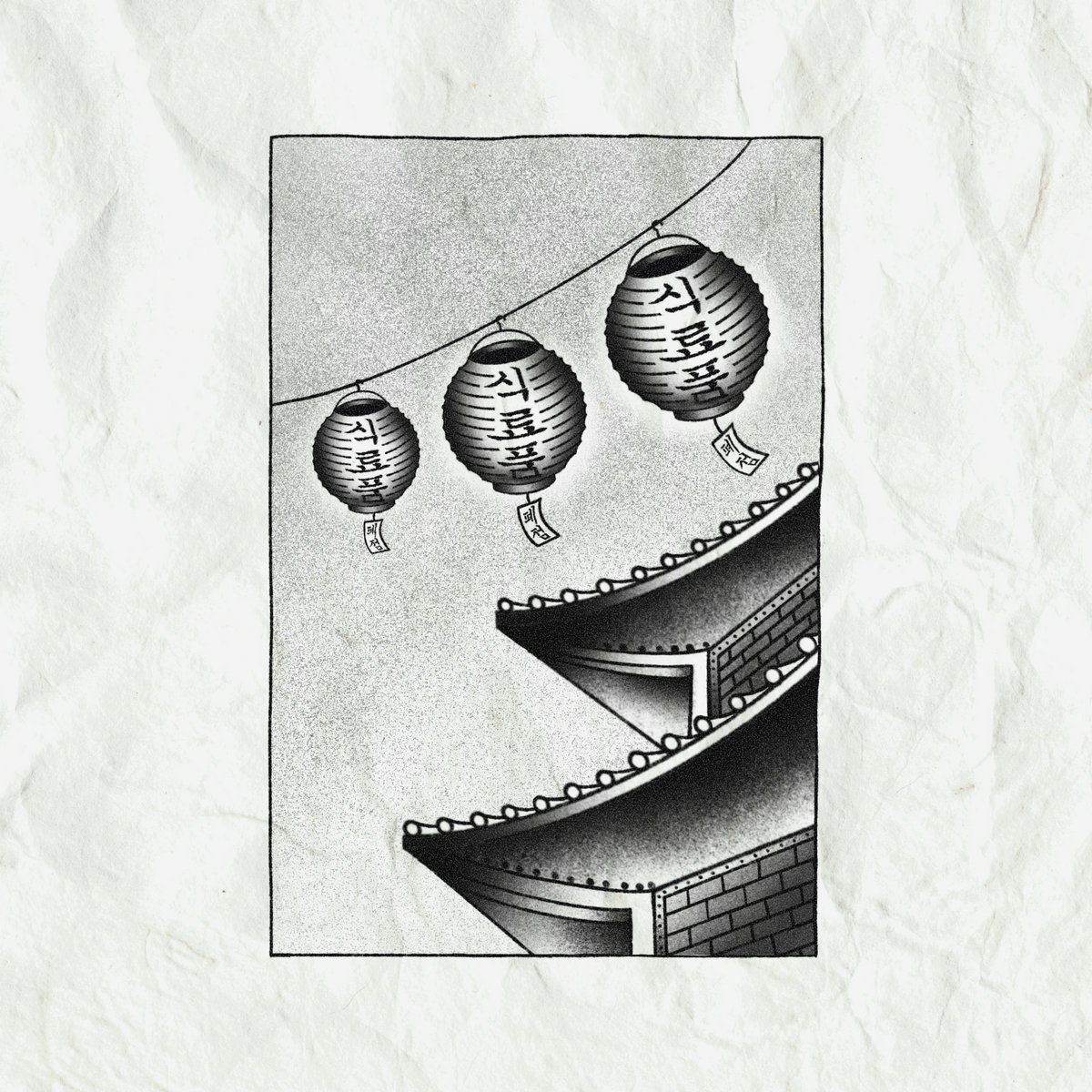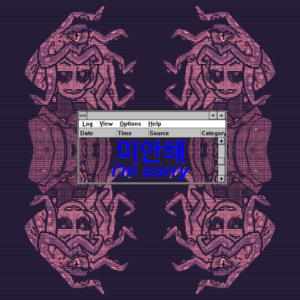
Album Review
폐점 (Closing)
by: 식료품groceries
Written By: Matsu
Published: October 18th, 2022
Album Released: August 5th, 2022
Known previously for releasing albums with consistently strong thematic premises, quality of production, and presentation between long periods of time, 식료품groceries is one of the most recognizable names in both mallsoft and the freshly redefined utopian virtual subgenres of vaporwave. While many of his previous albums under this alias have tackled ideas through collecting and arranging tracks in a traditional track-by-track series, the most striking thing about this newest album is its choice to work with a new set of rules.
Only two tracks are set before the listener, complimenting one another to make a cohesive whole. While there is a more dissected tracklist contained within additional materials supplied with the album, the main way the listener is presented with the contents shows how it was intended to be experienced. By doing this, 폐점 challenges listeners to approach it as a fully imagined piece front to back, or at least to its halfway point. In similar situations, artists in the past have used this methodology in order to create a cohesive stream of music that straddles the invisible space between a mixtape and an album.
폐점 takes this idea and does its best to bring out the most entertaining elements from both worlds, allowing itself to pick from the varieties of texture that a mix’s sound can offer and bringing it together with the atmosphere and direction that belongs to a full album. From front to back, ideas flow into one another to compliment and contrast, wordlessly telling a story in a way that makes good use of its mix-style format.

Album Art By Sugar Crash
The Sound
The most interesting thing about the collection of sounds contained within 폐점 is something that has come up within recent vapor a lot as formerly sample-oriented artists draw themselves towards original creations. As 식료품groceries made his move from 슈퍼마켓Yes! We’re Open (Supermarket Yes! We’re Open) and Housewares to 인터넷 쇼핑 (Ascension) (Online Shopping (Ascension)), samples were almost entirely lifted away from the process to display original compositions. By showing this process, 폐점 is in a unique space where it is difficult to tell what within it is original and what is sampled, as the base parts within all feel smoothly connected, yet each one is crafted to fit a musical niche where judging its nature of origin proves daunting.
Ironically, questioning the sampled nature of these tracks only makes them that much more impressive. The artist has progressed to a point where their quality is high enough to be mistaken for a direct sample, muddling original work with true samples to only put this further on display. More importantly, it shows how each previous album has built towards this, a naturally fitting peak of a project that has spanned nearly a decade with different angles, aesthetics, and methods of achieving and arranging its desired sound, all centered around the goal of bringing the most musical potential around one central idea.
As his first two albums explored the sounds present within a physical store and the third moved towards the MIDI-fied realities of the early online market, 폐점 looks further beyond for its premise, choosing to stop itself at the very end of its saga. As the difficulty of pinning down the exact feeling that the initial two albums imparted became part of their charm, so does this additional way that 폐점 stands free from the ideas of its predecessors.
Muted and moody, a somber atmosphere lies behind each track that sprawls from front to back and pulls the listener along, ambiance and static laying a backdrop to help amplify the desolation. Familiarity in a return to lost nostalgia defined much of the wave of mallsoft that partook in similar tactics, yet in turn letting fresher ideas fade and wander off into the constant backdrop gives equal power to the seamless flow of track after track.
Dance, minimalism, ambiance, new age, jazz, and nearly every style that 식료품groceries has flirted with make a triumphant return to be repurposed into this reworked return, giving a turn to punctuate themselves within this new format, rather than fade away into an improbable distance as they make their leave. The sounds of a collective city surround this focal point of a store that the artist has brought along for so many years, concluding all that came before it in a cohesive tour. Even tracks with drive to them are given a more ominous edge with careful adjustments to pitch and the individual punch of each instrument. Percussion is made less striking, pushed to the background to give more attention to the more moody, reflective treble of heavily electronic tracks.
After so much time spent building up its mood piece by piece, the album coalesces with a rise of action, taking time to pull from its gloomier tones in order to give some hopefulness to the more desolate feeling that surrounded it. As eras pass behind it in familiar samples, even the ending that it presents will lead to something new. An upward trail of chords and arpeggios lead to a fade outward, just as everything before had done to usher in what is next. Only this time, it comes on 폐점‘s own terms, fading into the background once everything has finally been said and done.
The Flavor
While the series of works that came before it gave a sense of progression in era, 폐점 takes its stride in the state of matters, its transliteration “Closing” giving us a sense of why the mood is more solid than in previous works. An outline of such a story is being told through its tracks, of a shop and the city surrounding it as the doors shut and memory of it fades out, the future seeming cautiously bright after everything falls through.
Although more releases in a similar vein may follow it, they have surpassed the original framework. The same thematically is true for the span of albums that led towards 폐점‘s existence, a saga with a fittingly punctuated end. While it may begin anew in the future, the original thread of thoughts has been tied down following its artist’s noticeable progression in skill and ambition.
In such a sense, 폐점 feels like a proper send-off to it all. Its musical flair and sense for scenery to place its sounds within is as strong as ever, enhanced by the climb in ability that 식료품groceries had made between Housewares and 인터넷 쇼핑 (Ascension). Both original and sampled sounds are embraced in order to create an anthology and a tribute to this era of his own sound, closing the store and closing a chapter on his boundless contributions to the vaporwave scene since his emergence.
The Issues
While not many, there are a few things that hold 폐점 back in the end, especially when held to its own and without the most powerful aspect of its ideas: The context. A significant amount of what 폐점 is made powerful and poignant by is context-dependent, which must be put aside when looking at the music itself. While the gripes it presents are minor, they tend to be heavily recurring throughout the album’s runtime.
One significant difficulty made in the transfer of track formatting is the length of its individual ideas, or rather, the excess of it. While the consistency of mood helps with keeping a steady flow of thoughts, some of them overstay, dragging on past the point where their full potential may lay. This is especially noticeable near the end of the final track, which rises through only a few simple motions within the span of seven minutes. There is something to admire in its dedication to this final rise, but a smaller runtime may have helped give the punctuation of its final few notes some more value.
The only other aspect that stands in its way are a few odd, occasional heavy tone shifts that spread across many tracks instead of pushing from one mood to the other, such as the unusually boisterous and polished sound of the second sub-track from “II.” Exploding into energy out of nowhere, its presence feels somewhat odd within the middle of either track, seeming as if it would fit more as a closer to “I.” to pair and contrast with the less intense, progression-heavy finale of “II.”
Conclusion
폐점, by its very nature in concept and execution, will hit the hardest with those who have followed each album that preceded it and were able to see the sheer span of time and effort that was put into developing the sound that allowed the album to become its truest expression in the end. From start to finish of its runtime, all cylinders are firing from places left dormant for years, along with pieces polished in more recent times. It’s a machine built from everything before it and an end product only held back by more integral pieces of identity that the project itself has held close since its start.
Altogether, these aspects aid 폐점 in being one of the most impressive works by 식료품groceries yet, both as a statement of where he is currently as an artist, and what there is to the future.
식료품groceries
Get The Album!
Favorite Track: I.
Favorite Sub-Track: 느리게 (Slow)
Score: 4/5












